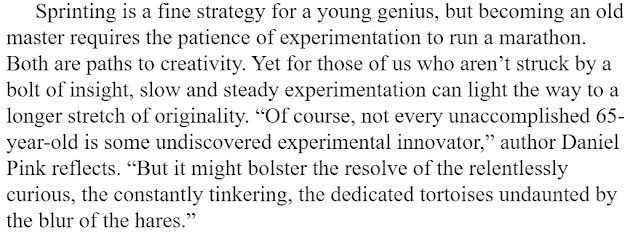From Adam Grant in "Originals"
Grant argues that innovation most often comes conceptually in the young and experimentally from the 'old masters'. In basketball, both apply.
Consider Don Meyer's 'three phases' of coaching - blind enthusiasm, sophisticated complexity, and mature simplicity.
Blind enthusiasm moves coaches hither and yon, wondering about this and that. Mature simplicity embeds persistence and failure, as in "that doesn't work; I abandoned it."
Consider our coaching. Do you coach the same way now as when you started? Coaches revise our psychological reserves, our teaching analogies, drill book, and playbook. What is right for teaching novices differs from teaching the more mature or the highly trained.
Consider Anson Dorrance's "competitive cauldron" of UNC women's soccer. He and his staff grade and rank every player daily. Everyone knows who inhabits the top and bottom of their world. For nationally ranked college players and teams, that worked. Young players with less experience and less established "ego," should never be exposed to that approach. If you want to create mental health problems and 'corporate rage', that would work.
Brian McCormick wrote "Fake Fundamentals," sharing what he considered outdated drills (above). In this post, I shared drills I used and abandoned for a variety of reasons, including injury prevention.
A worthy goal is not comparing ourselves to other coaches but comparing ourselves today to our prior coaching. That recognizes a permanent room for growth. Many great writers like Salman Rushdie argue that good writing is rewriting, with our creative self and our critical self.
Lagniappe. Sport rewards explosive athletes.
10 Exercises To Become A More Explosive Athlete WITH NO EQUIPMENT
— Austin Jochum (@AustinJochum) October 29, 2024
Not Every Accessory Needs To Be Done With A DB And If You Are Traveling With No Access To A Gym There Are About 10,000 Things You Can Do pic.twitter.com/UPX4LOhOUm
Lagniappe 2. JVG teaches roll and replace (Villanova uses a separate version).
Coach Jeff Van Gundy teaching the "roll and replace" ball screen
— The Courtside Vault (@CourtsideVault) October 28, 2024
A true basketball teacher
Read progression for bigs at the top of the key:
-Shot
-High Low
-Weak Side pic.twitter.com/ycWyKoOMYx

